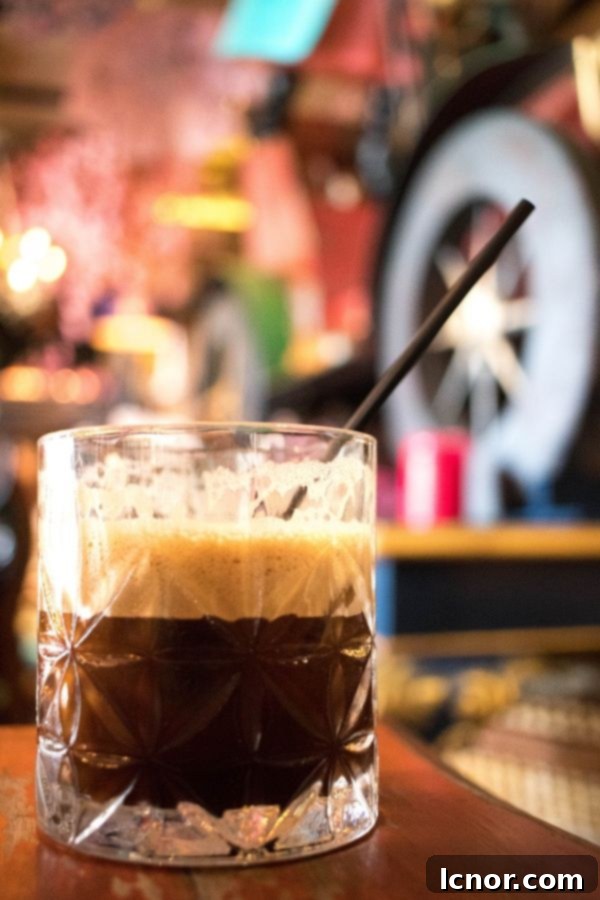The Ultimate Guide to Greek Coffee Culture: What to Order & Where to Sip in Athens
Prepare to be enchanted by the rich and vibrant coffee culture in Greece, a journey we absolutely fell in love with during our visit to Athens. Beyond exploring ancient wonders like the Acropolis and indulging in the incredible food scene, you’ll discover that sipping coffee is an essential part of the Greek way of life. It’s more than just a drink; it’s a social ritual, a pause in the day, and a key to understanding the local pace. From bustling city cafes to charming seaside spots, coffee in Greece offers a unique experience unlike any other.
This comprehensive guide will walk you through the fascinating world of Greek coffee, introducing you to the diverse types you can order, helping you navigate the local customs, and pointing you to some of our favorite spots in Athens to truly immerse yourself in this delightful tradition.
Table of Contents
Exploring Greek Coffee: What to Order
Greece offers a fantastic array of coffee types, ranging from the time-honored traditional brew to modern, refreshing iced concoctions perfect for its warm climate. Here’s a guide to what you can expect to order and enjoy.
Traditional Greek Coffee (Kafe Elliniko)
Also known as Turkish or Arab coffee, Kafe Elliniko is an iconic staple of Greek culture. Unlike filtered coffees or espresso, it’s prepared by boiling finely ground coffee beans directly in a special pot called a briki (or ibrik). This method creates a strong, robust coffee with a distinctive layer of foam (kaimaki) on top and a thick layer of sediment at the bottom. It’s served in a small, handle-less cup, similar in size to an espresso, and is meant to be savored slowly, allowing the grinds to settle.
The beauty of traditional Greek coffee lies in its customizable sweetness. You can order it in several ways to suit your preference:
- Sketos (plain): Black coffee with absolutely no sugar. This is for the purists who appreciate the strong, unadulterated flavor.
- Metrios (medium): A balanced option with 1 teaspoon of sugar per 1-2 teaspoons of coffee, offering a harmonious blend of bitterness and sweetness.
- Glykos (sweet): For those with a sweet tooth, this version comes with 2 teaspoons of sugar per 1 teaspoon of coffee, making it noticeably sweeter.
- Varis (strong): While not directly about sugar, this refers to a stronger brew (2-3 teaspoons of coffee) with typically 1 teaspoon of sugar, for an intense coffee experience.
- Variglykos (strong and sweet): The most intense and sweetest, with 3 teaspoons of coffee and 3 teaspoons of sugar.
- Ne ke Ohi (yes and no): A unique request for a very mild coffee with just ½ teaspoon of sugar per 1 teaspoon of coffee, implying “not too strong, not too sweet.”
Embracing Greek coffee is about more than just drinking; it’s about the experience. Don’t stir it once served, and stop drinking before you reach the grinds at the bottom. For those inspired to try this at home, this post on making traditional Greek coffee is a great resource.
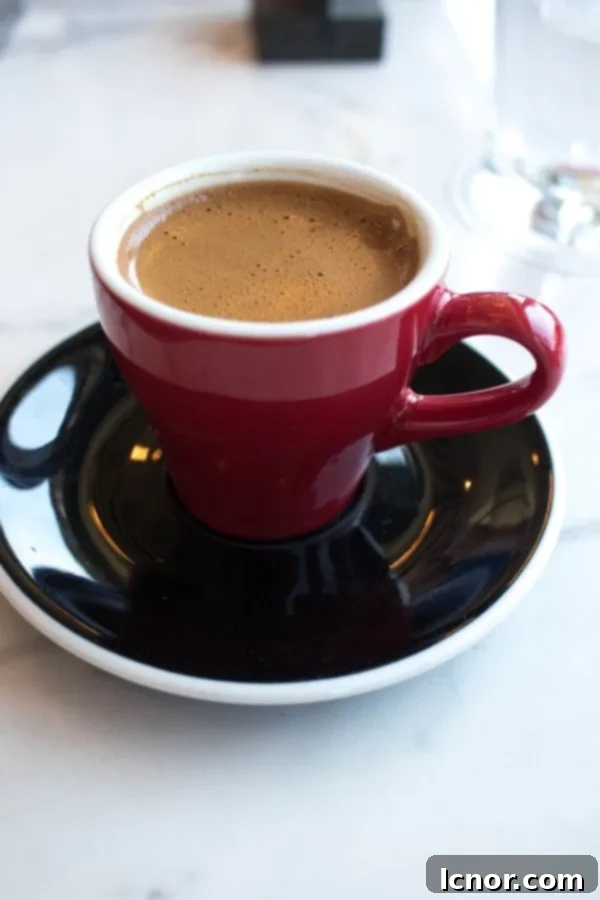
Average cost: 1.50 – 2€
Espresso Freddo
A true testament to Greece’s adaptability to warm climates, the Espresso Freddo is a modern phenomenon and one of the most popular coffee orders in the country, especially during the scorching summer months. This invigorating cold coffee is made by blending a double shot of fresh espresso with ice cubes in a mixer until a thick, creamy foam forms. It’s then poured over fresh ice into a tall glass. The result is a delightfully strong, yet incredibly refreshing, iced coffee with a velvety texture. My travel companion and I enjoyed countless Espresso Freddos during our time in Athens – they’re simply irresistible!
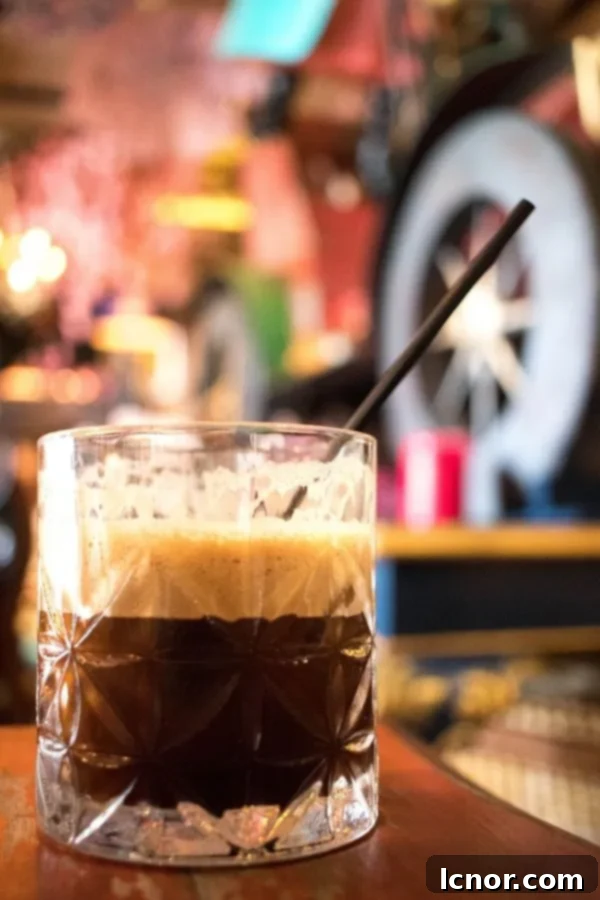
Average cost: 2.50 – 3.50€
Cappuccino Freddo
Building on the popularity of the Espresso Freddo, the Cappuccino Freddo offers a colder, creamier twist on a classic. It combines a double shot of espresso, mixed with ice, and is then topped with a generous layer of cold, frothed milk (often made with a special mixer to achieve maximum frothiness). The result is a luxurious, layered drink served in a tall glass, perfect for those who love the smoothness of milk with their coffee, but prefer it chilled. Along with the Espresso Freddo, it quickly became my personal favorite!
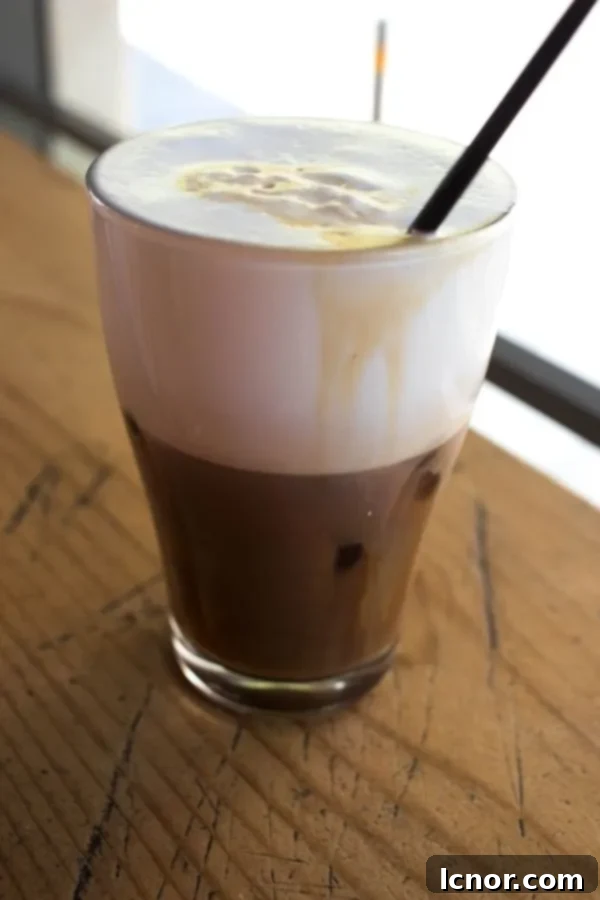
Average cost: 2.50 – 3.50€
Frappe
The Frappe holds a special place in Greek coffee history. Invented purely by accident by a Nescafe employee at the 1957 Thessaloniki International Fair, this simple yet iconic iced coffee quickly became the undisputed king of cold coffee in Greece for decades. Made from instant coffee, water, and sugar, it’s vigorously shaken or blended to create a frothy, foamy texture, then served over ice. You can specify your desired sweetness: sketos (no sugar), metrios (medium sweet), or glykos (sweet).
While its popularity has somewhat been overtaken by the trendier Espresso Freddo and Cappuccino Freddo in recent years, the Frappe remains a beloved classic for many Greeks. It’s an acquired taste for some due to the instant coffee base, but it’s a quintessential Greek experience to try at least once.
View this post on Instagramfrappé love 🙌🏼
A post shared by I S A B E L L A (@lifeisisa) on
Average cost: 2.50 – 3.50€
Espresso
While often associated with Italy, the espresso holds a firm place in Greek coffee culture, influenced by its close Mediterranean neighbor. In Greece, espresso is typically served “tight” or ristretto, meaning a concentrated shot of rich, dark coffee. It’s an excellent choice for a quick morning boost or an afternoon pick-me-up. Many cafes pride themselves on using high-quality beans, ensuring a robust and flavorful shot. It’s usually served in a small, classic espresso cup.
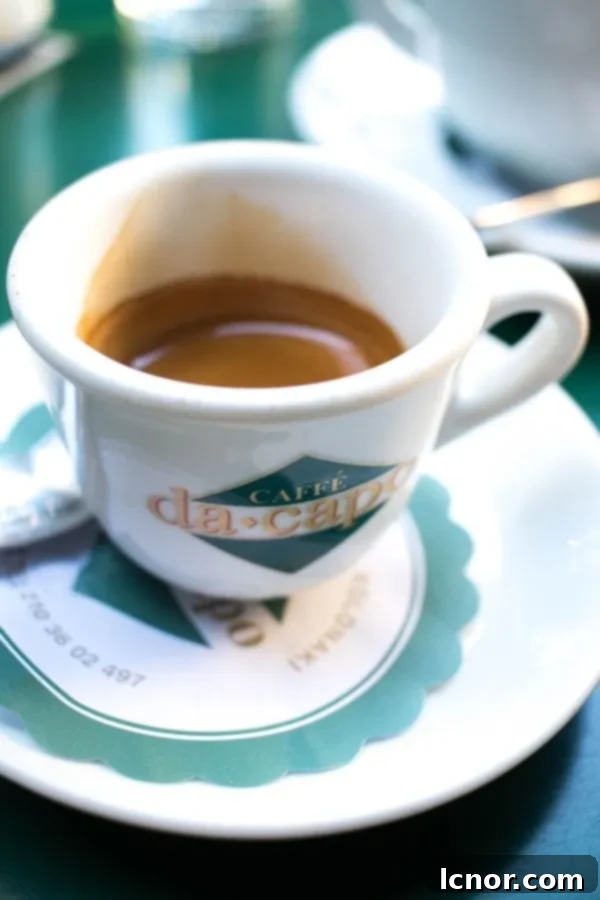
Average cost: 1.50 – 2€
Cappuccino
The classic cappuccino is as popular in Greece as it is worldwide. Made with espresso, steamed milk, and a layer of frothed milk on top, it’s a comforting and familiar choice for many visitors. Greek baristas often craft beautiful latte art, showing their skill and passion for coffee. Whether you prefer it hot or simply aren’t in the mood for an iced drink, a well-made cappuccino is always a delightful option in Greek cafes, offering a perfect blend of rich espresso and creamy milk.
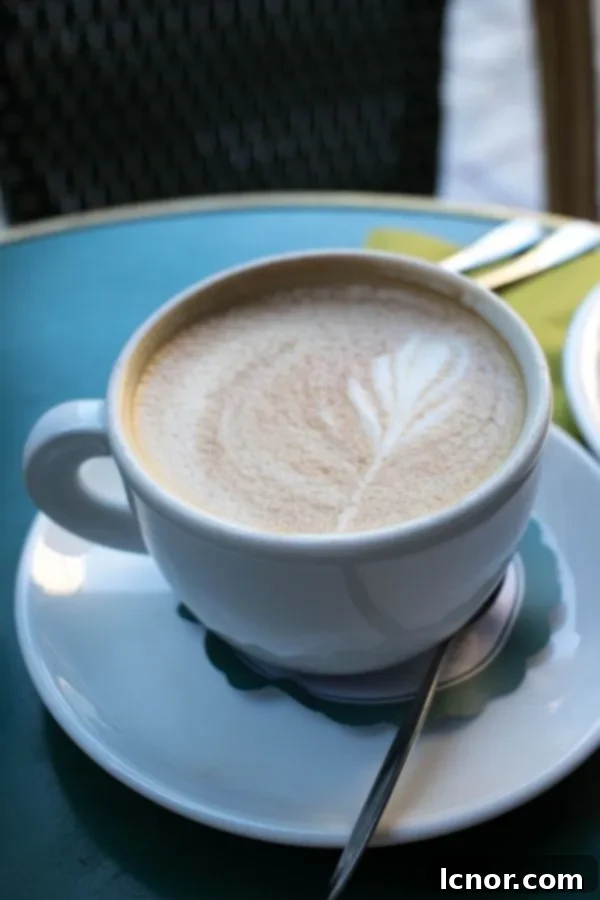
Average cost: 2 – 3€
Our Favorite Coffee Shops in Athens
Athens is a city brimming with fantastic cafes, from historic kafenios to modern specialty coffee shops. Finding the right spot can truly enhance your Greek coffee experience. During our visit, we discovered a few gems that left a lasting impression. When you’re in Athens, make sure to check out these spots to enjoy authentic Greek coffee culture:
- Da Capo: Located at Tsakalof 1, Kolonaki Square, Da Capo is a classic Athenian establishment renowned for its quality coffee and prime people-watching location. It’s a perfect spot to soak in the chic atmosphere of Kolonaki.
- Taf Coffee: You’ll find Taf Coffee at Emmanouil Mpenaki 7. This specialty coffee shop is a must-visit for serious coffee aficionados. They are famous for their high-quality beans, expert brewing, and dedication to the craft, offering a truly elevated coffee experience.
- Carpo: Situated at Kanari 6, Carpo is not just a coffee shop but also a purveyor of fine nuts, dried fruits, and chocolates. Their coffee is exceptional, and the vibrant, aromatic atmosphere makes it a delightful stop.
- Little Kook Cake Shop: While primarily a magical themed cake shop, Little Kook (Karaiskaki 17, Athina 105 54) also serves coffee in an enchanting setting. It’s an experience in itself, perfect for those who want a whimsical break with their brew.
Beyond these recommendations, don’t hesitate to wander and discover smaller, local cafes (kafenios). These often offer a more traditional and authentic slice of Greek daily life. Look for places bustling with locals – it’s usually a good sign!
Your Greek Coffee Culture FAQs Answered
We reached out to our Instagram audience for their most pressing questions about Greek coffee, and here are the answers to help you navigate your coffee journey through Greece!
Is Coffee Popular in Greece?
Absolutely, coffee is incredibly popular in Greece; it’s practically the heartbeat of daily social life. Greeks don’t just drink coffee; they engage in an elaborate social ritual around it. Coffee breaks are often extended affairs, lasting for hours, where friends and family gather to chat, debate, and simply enjoy each other’s company. The culture revolves around leisurely sips in a cafe, rather than grabbing a quick cup on the go. You’ll see cafes bustling from morning till late evening, embodying the “siga-siga” (slowly, slowly) pace of Greek life. It’s a significant part of their social fabric and a perfect way to observe local life unfold.
Is Coffee Good in Greece?
Yes, emphatically yes! Coffee in Greece is genuinely delicious. The strong tradition and high demand mean that Greek cafes, whether traditional or modern, generally uphold very high standards. From the robust, earthy notes of traditional Greek coffee to the refreshing, creamy perfection of a Freddo Espresso, every cup we tried was a delightful experience. The passion for coffee is evident in the quality of beans used and the skill of the baristas. Make sure you dedicate time during your trip to explore the local coffee scene; your taste buds will thank you!
How to Order Coffee in Greece?
Ordering coffee in Greece is generally straightforward, and most people in tourist areas, especially younger generations, speak excellent English. However, making an effort to use a few Greek phrases can significantly enhance your experience and is always appreciated by locals. Start with a friendly Γεια σου (Ya su – Hello, informal) or Καλημέρα (Kaliméra – Good morning). Here are some key phrases for ordering:
- “Ένα Freddo Espresso, παρακαλώ.” (Ena Freddo Espresso, parakaló. – One Freddo Espresso, please.)
- “Ένα Καφέ Ελληνικό, σκέτο.” (Ena Kafé Ellinikó, skéto. – One Greek Coffee, plain.)
- “Ένα Frappe, μέτριο.” (Ena Frappe, métrio. – One Frappe, medium sweet.)
- “Με γάλα, παρακαλώ.” (Me gála, parakaló. – With milk, please.)
- “Χωρίς ζάχαρη.” (Horís záhari. – Without sugar.)
Don’t be shy to ask if you’re unsure. Greeks are incredibly welcoming and will happily assist you in finding your perfect brew!
How Much is Coffee in Greece?
Compared to many Western European cities, especially places like Paris where we reside, coffee in Greece is quite affordable. Prices can vary slightly depending on the type of coffee, the location (a tourist hotspot versus a local neighborhood), and whether you’re taking it to-go (gia na páo) or sitting down (which often costs a bit more). Generally, you can expect traditional Greek coffee or a standard espresso to cost between 1.50€ and 2.50€. Freddo variations typically range from 2.50€ to 4€.
While prices might be higher in very upscale or prime tourist locations, the overall cost of enjoying a high-quality coffee remains very reasonable, especially considering the long hours you’re often encouraged to spend in a cafe.
Why is Coffee Expensive in Greece?
The perception of coffee being expensive is always relative. While some might find it pricier than, say, Italy, we found Greek coffee to be quite reasonable, especially when considering the quality and the entire cafe experience. Several factors contribute to coffee pricing in Greece:
- Import Costs: Greece does not grow its own coffee (see below), so all beans must be imported, incurring import duties and transportation costs.
- VAT and Taxes: Value Added Tax (VAT) and other local taxes contribute to the final price.
- Labor and Overhead: The cost of skilled baristas, rent for prime cafe locations, and general operating expenses.
- The Cafe Experience: In Greece, you’re not just paying for the coffee itself, but for the entire social experience. Cafes provide a comfortable space to relax, socialize for extended periods, and enjoy impeccable service. This “dwell time” is implicitly factored into the price.
Ultimately, when you factor in the quality, the service, and the unhurried atmosphere, the cost of coffee in Greece offers great value for the overall cultural experience.
Does Coffee Grow in Greece?
No, coffee does not grow in Greece. The climate and soil conditions in Greece are not suitable for cultivating coffee plants. All coffee beans consumed in Greece are imported, primarily from countries in South America, Africa, and Asia. Despite not growing its own beans, Greece has developed a sophisticated and deeply ingrained coffee culture built on these imported varieties.
Can You Get Decaf Coffee in Greece?
Yes, you can certainly find decaf coffee in Greece, especially in larger cities like Athens and Thessaloniki, and in more modern or specialty coffee shops. While it might not be as universally available as regular coffee in every small village kafenio, most contemporary cafes will offer decaffeinated espresso, which can then be used to make decaf versions of popular drinks like Espresso Freddo or Cappuccino. I must admit, we don’t usually order decaf, so we weren’t actively seeking it out, but based on our observations of the burgeoning specialty coffee scene, it’s becoming increasingly common. Don’t hesitate to ask for “decaf” or “χωρίς καφεΐνη” (horís kafeíni); Greeks are known for their hospitality and willingness to help you find what you need.
Embrace the Greek Coffee Experience!
From the first strong sip of a traditional Greek coffee to the refreshing chill of a Freddo Espresso, the coffee culture in Greece is an unforgettable part of any visit. It’s an invitation to slow down, connect with locals, and truly immerse yourself in the Mediterranean pace of life. So, when you plan your trip, make sure to carve out plenty of time to explore the diverse coffee offerings and savor every moment in the charming cafes of Athens and beyond. Kali Apólafsi!
Pin for later!

Related Posts
Food in Athens – Everything You Must Eat in Athens & The Best Food Tour
Don’t Miss These Cafes in Paris!
Partisan Cafe Paris
